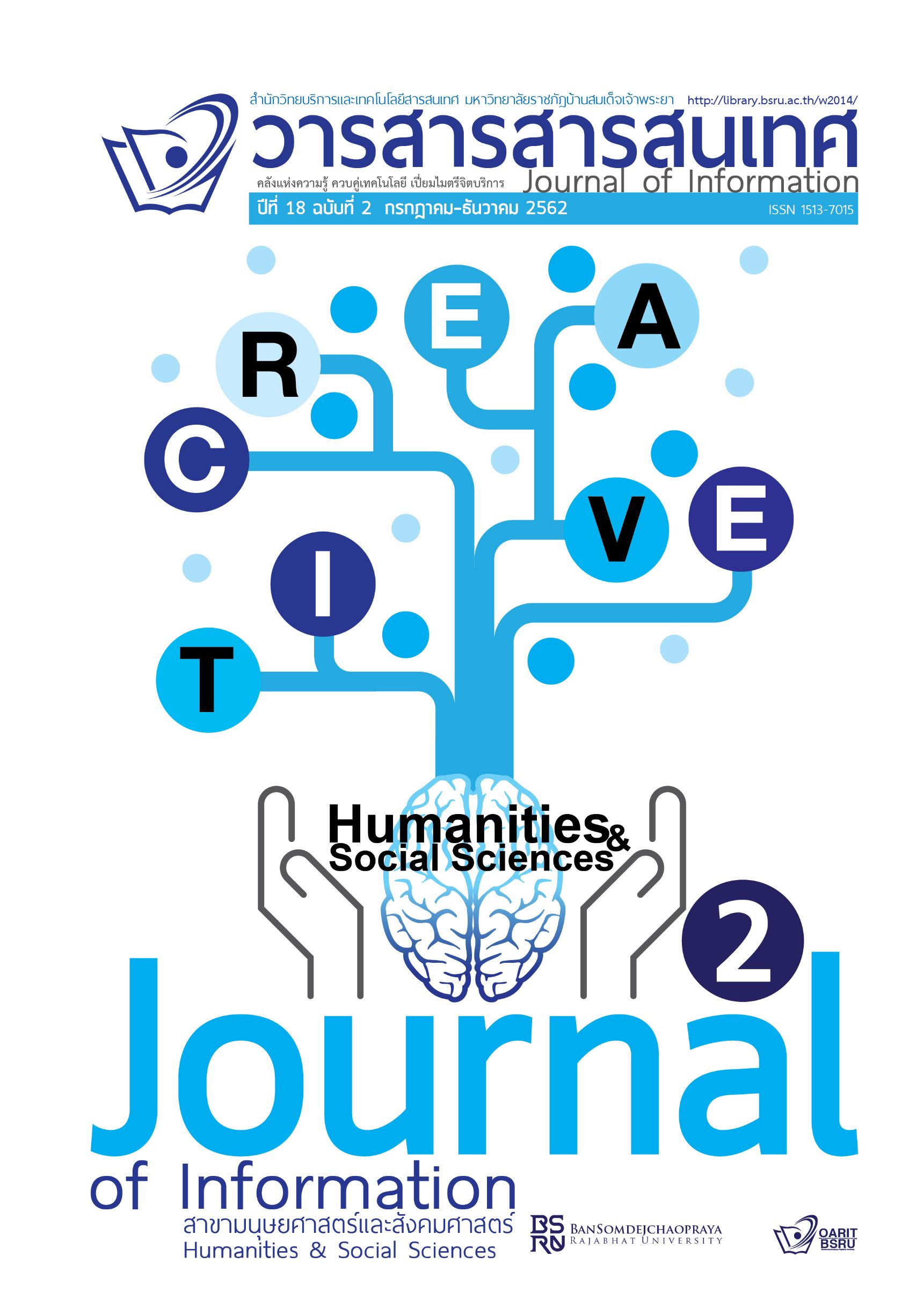The Inheritance of Moh-Pi of the Lao Song in Kao YoiDistrict, Phetchaburi Province Case Study: Mr.YonHomlom
Keywords:
Lao Song, Inheritance, Moh-PiAbstract
The research of ¨The inheritance of Moh-Pi of the Lao Song in Kao Yoi District, Phetchaburi Province, Case Study: Mr.Yon Homlom¨ has purposes to profoundly study about the inheritance and succession of Moh-Pi of the Lao Song in Kao Yoi District, Phetchaburi Province.
This study is implemented in compliance with the research procedures, i.e., examining relevant documents and doing a field study for interviewing these indigenous people to collect data of Mr.Yon Homlom, who is the most prestigious person in his group by his deep knowledge of this ritual event being inherited to be Moh-Pi in the period that there were various changes in several rules and conditions. Then, the data is analyzed based on the selected theories.
This research is vitally useful for musical learning in the aspect of anthropology since there have not been any studies of this area yet. Therefore, the researchers are interested in studying this area of work for compiling this data collection systematically.
According to the study, it has been found that a person who could be Moh-Pi in the old days must be inherited by lineage, with flawless behavior. Besides, the person needs to be accepted by the Lao Song knowing the ritual worship inside out. Moreover, the person has to have the capacity of blowing pipe and creating it by himself.
As reported by the field study, it appeared that a social change, in many aspects, not only external but internal, has brought the crisis of this tradition due to the lack of inheritors these days, especially the condition of inheritance through heredity that blocks others from being able to be Moh-Pi. However, such a condition is more flexible in the present-day in order to offer an opportunity for non-lineage qualified persons to further the role of Moh-Pi. Thus, if there is still no serious management of legacy, the amount of Moh-Pi in the Lao Song society may keep reducing and would finally disappear in the very next future.
References
คณะมนุษยศาสตร์และสังคมศาสตร์ มหาวิทยาลัยราชภัฏรำไพพรรณี.
บุญยงค์ เกศเทศ. (2546). สืบสานวัฒนธรรม ชาติพันธุ์-ไท สายใยจิตวิญญาณ ลุ่มน้ำดำ-แดง. กรุงเทพฯ:
หลักพิมพ์.
----------. (2554). ไทดำ” เมืองแถง “ทรงดำ” ถิ่นสยาม จากหนองแฮด ถึง หนองปรง. กรุงเทพฯ: อินทนิล.
พรพิมล ชันแสง. (2541). อิ่นก๋อน: ประเพณีการละเล่นของลาวโซ่ง อำเภอเขาย้อย จังหวัดเพชรบุรี
(วิทยานิพนธ์ปริญญามหาบัณฑิต). นครปฐม: มหาวิทยาลัยมหิดล.
เรณู เหมือนจันทร์เชย. (2541). การศึกษาอิทธิพลของความเชื่อ ประเพณี และของพิธีกรรมชาวไทยโซ่งที่มี
ผลต่อการพัฒนาคุณภาพชีวิต (วิทยานิพนธ์ปริญญามหาบัณฑิต). นครปฐม: มหาวิทยาลัยมหิดล.
----------. (2542). ความเชื่อเรื่องผีของไทยโซ่ง. นครปฐม: สถาบันวิจัยภาษาและวัฒนธรรมเพื่อพัฒนาชนบท
มหาวิทยาลัยมหิดล.
สิริกานต์ ศิลาไพร และคณะ. (ผู้ถ่ายภาพ). (2562). นายยน ห้อมล้อม [ภาพถ่าย]. กรุงเทพฯ: สาขาวิชา
ดนตรีไทยเพื่อการอาชีพ วิทยาลัยการดนตรี มหาวิทยาลัยราชภัฏบ้านสมเด็จเจ้าพระยา.
อัมรินทร์ แรงเพ็ชร. (2545). วงปี่ไม้แมน : ดนตรีในพิธีเสนของชาวลาวโซ่ง ในอำเภอเขาย้อย จังหวัดเพชรบุรี
(วิทยานิพนธ์ปริญญามหาบัณฑิต). นครปฐม: มหาวิทยาลัยมหิดล.
----------. (2559). ตุ๊บเก่ง: ดนตรีพิธีกรรมและพลวัตทางสังคม บ้านป่าแดง ตำบลป่าเลา อำเภอเมือง
จังหวัดเพชรบูรณ์ (รายงานการวิจัย). กรุงเทพฯ: วิทยาลัยการดนตรีเจ้าพระยา
มหาวิทยาลัยราชภัฏบ้านสมเด็จ.
Downloads
Published
Issue
Section
License
บทความ ข้อความ ภาพประกอบ และตารางประกอบที่ลงพิมพ์ในวารสารเป็นความคิดเห็นส่วนตัวของผู้นิพนธ์ กองบรรณาธิการไม่จำเป็นต้องเห็นตามเสมอไป และไม่มีส่วนรับผิดชอบใดๆ ถือเป็นความรับผิดชอบของผู้นิพนธ์เพียงผู้เดียว


